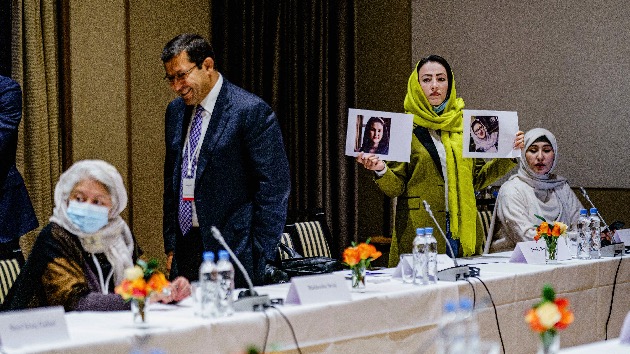
(LONDON) — “Pick up the phone right now, call Kabul and ask the girls to be released immediately,” Hoda Khamosh, an Afghanistan woman’s rights activist shouted at the Taliban’s acting foreign minister, Amir Khan Muttaqi, in Oslo, Norway, last week.
Khamosh demanded the release of Tamana Zaryabi Paryani and Parawana Ibrahimkhel, two female activists who disappeared after their houses were raided on Jan. 20. They had attended a series of protests against the Taliban over the past few months.
Khamosh was one of six Afghan women who were invited to sit with Taliban officials as they made their first invited visit to a Western country since taking control of Afghanistan in August. The talks were to discuss the humanitarian and economic situation in Afghanistan.
The invitation led to different reactions from Afghanistan’s various women’s rights activists, with some welcoming it as a chance for Afghan-to-Afghan negotiations. Others felt that Taliban rule should not be normalized by holding such meetings and casted doubts on the trustworthiness of their promises.
“It was important to us that Norway stressed the invitation did not mean recognition of the Taliban,” Khamosh told ABC News, explaining how the “horrible humanitarian situation” in Afghanistan compelled her to sit face-to-face with the Taliban, pushing for a way to get as many concessions from them as possible.
According to the United Nations Children’s Fund, around 10 million children across Afghanistan are in “urgent” need to humanitarian assistance to survive.
“Without urgent action, almost one million children could be severely malnourished in the coming weeks. That is half of all children under the age of 5,” UNICEF says.
“We were discussing how the money can come to Afghanistan and help with opening schools, opening offices, creating jobs and making the economy wheels turn,” Khamosh said.
However, the Taliban’s track record of female suppression has left many women’s rights activists with almost no reason to trust their promises.
“It is why my first request in the beginning of the meeting with the Taliban was to release our fellow activists they had arrested,” Khamosh said.
In the statement released by the governments of the U.S. and Norway about the Oslo meeting, the Taliban was “urged” to do more to stop the alarming increase of human rights violations, “including arbitrary detentions (to include recent detentions of women’s rights activists), forced disappearances, media crackdowns, extra-judicial killings, torture and prohibitions on women and girls’ education, employment and freedom to travel without a male escort.”
However, the acting foreign minister Muttaqi denied the arrests of the activists for whom Khamosh demanded freedom, saying that the Taliban had not arrested or tortured those women.
“I do not trust him,” Khamosh said, reacting to Mottaqi’s denial. She said she’d been handed documents by one of the women’s mothers that showed the women had been taken by the Taliban.
“This is why the west should not give all the money the Taliban wants in one go and not to give it directly to them,” she said. “We have to wait and see the Taliban’s next move and real intention to fulfil their promises first.”
Former Afghan parliamentarian Shinkai Karokhail, who shared the same concerns as Khamosh, said the Taliban must end its hostilities against women and take a moderate approach towards human rights, as many things have changed since the last time they had the control of the country.
Karokhail advocated for women’s rights during her term, but had to flee Afghanistan when the country fell into the Taliban’s hands.
“Two decades has passed and lots of changes happened in the life of Afghans,” she said, adding that the Taliban has no way but to end isolating women from their social an economic life of Afghanistan.
The Taliban did not respond to ABC News’ inquiry about the Oslo talks and the topics discussed.
Karokhail said she feels the West must ask the Taliban to prove themselves before entering into talks, telling ABC News: “We have to use this Oslo event like a ticket. A ticket that must not be used so much.”
ABC News’ Aleem Agha contributed to this report.
Copyright © 2022, ABC Audio. All rights reserved.
